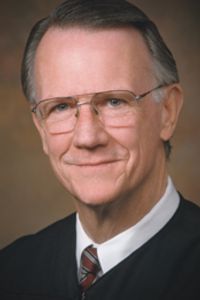Phil Johnson
Phil Johnson was a justice of the Texas Supreme Court. Governor Rick Perry (R) appointed Johnson on March 15, 2005. He was re-elected on November 4, 2014.[1][2] Johnson retired December 31, 2018.[3] To learn more about this vacancy, click here.
Education
Johnson received his J.D. from Texas Tech University School of Law in 1975.[4]
Career
- 2005-2018: Judge, Texas Supreme Court
- 2002-2005: Chief judge, Texas Seventh District Court of Appeals
- 1998-2002: Judge, Texas Seventh District Court of Appeals (Elected)
- 1975-1998: Attorney in private practice[5]
Military service
Johnson served in the U.S. Air Force from 1965 to 1972. He was a pilot and served in the Vietnam War.[4]
Awards and associations
- Member, College of the State Bar
- Life fellow, Texas Bar Foundation
- Life fellow, American Bar Foundation
- Past president, Lubbock County Bar Association[4]
Elections
2014
- See also: Texas judicial elections, 2014
Johnson ran for re-election to the Texas Supreme Court.
Primary: Johnson was successful in the Republican primary on March 4, 2014, receiving 64.0 percent of the vote. He competed against Sharon McCally.
General: Johnson defeated RS Roberto Koelsch (Libertarian) and Jim Chisholm (Green Party) in the general election on November 4, 2014, receiving 78.8 percent of the vote.[2][6][7]
Judicial poll
Below are the results of a 2014 judicial poll, conducted by the State Bar of Texas, which asked attorneys to cast a vote in favor of their preferred candidate in each appellate race.[8]
| Place 8 Justice | |
| Candidate: | Votes: |
|---|---|
| Jim Chisholm | 973 |
| Phil Johnson | 4244 |
| RS Roberto Koelsch | 835 |
| Sharon McCally | 2828 |
Endorsements
|
|
2008
Johnson was re-elected to the court in 2008.[10]
For a summary of the campaign contributions for Judge Phil Johnson, visit Follow the Money, Phil Johnson.
| Candidate | Incumbent | Seat | Party | Election % | |
|---|---|---|---|---|---|
| Phil Johnson |
Yes | Place 8 | Republican | 52.3% | |
| Linda Yanez | No | Place 8 | Democratic | 44.6% | |
| Drew Shirley | No | Place 8 | Libertarian | 3% |
2006
Johnson ran for election to the supreme court in 2006. He defeated Libertarian candidate Jay H. Cookingham, winning 76.3 percent of the vote.[11]
In his 2006 campaign, Phil Johnson raised $496,868.
For a detailed list of contributions, visit: Follow the Money: Phil Johnson
Political ideology
In October 2012, political science professors Adam Bonica and Michael Woodruff of Stanford University attempted to determine the partisan ideology of state supreme court justices. They created a scoring system in which a score above 0 indicated a more conservative-leaning ideology, while scores below 0 were more liberal.
Johnson received a campaign finance score of 1.05, indicating a conservative ideological leaning. This was more conservative than the average score of 0.91 that justices received in Texas.
The study was based on data from campaign contributions by the judges themselves, the partisan leaning of those who contributed to the judges' campaigns, or, in the absence of elections, the ideology of the appointing body (governor or legislature). This study was not a definitive label of a justice, but an academic summary of various relevant factors.[12]
See also
External links
- Project Vote Smart, "Justice Phil Johnson (TX)"
- Texas GOP Vote, "Interview with Texas Supreme Court Justice Phil Johnson"
- Justice Phil Johnson for Texas Supreme Court campaign website
Footnotes
- ↑ Judgepedia.org, “Judicial selection in Texas,” accessed November 21, 2014
- ↑ 2.0 2.1 Texas Secretary of State, "2014 March Primary Election Candidate Filings by County (A-L)"
- ↑ The Texas Tribune, "Texas Supreme Court Justice Phil Johnson to retire effective Dec. 31," November 8, 2018
- ↑ 4.0 4.1 4.2 The Supreme Court of Texas, "Justice Phil Johnson, Place 8"
- ↑ Project Vote Smart, "Justice Phil Johnson (TX)," accessed December 2, 2014
- ↑ Texas Secretary of State, "2014 March Primary Election Candidate Filings by County (M-Z)"
- ↑ Texas Secretary of State, "Republican Party Primary Election, Unofficial Results," 2014
- ↑ State Bar of Texas "Judicial Poll results," 2014
- ↑ Justice Phil Johnson for Texas Supreme Court, "Endorsements," accessed August 21, 2014
- ↑ Texas Secretary of State, "General Election Results," 2008
- ↑ Texas Secretary of State, "General Election Results," 2006
- ↑ Stanford University, "State Supreme Court Ideology and 'New Style' Judicial Campaigns," October 31, 2012
Federal courts:
Fifth Circuit Court of Appeals • U.S. District Court: Eastern District of Texas, Western District of Texas, Northern District of Texas, Southern District of Texas • U.S. Bankruptcy Court: Eastern District of Texas, Western District of Texas, Northern District of Texas, Southern District of Texas
State courts:
Texas Supreme Court • Texas Court of Appeals • Texas Court of Criminal Appeals • Texas District Courts • Texas County Courts • Texas County Courts at Law • Texas Statutory Probate Courts • Texas Justice of the Peace Courts
State resources:
Courts in Texas • Texas judicial elections • Judicial selection in Texas






